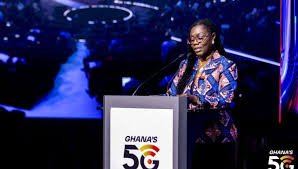On November 1, 2024, Ghana achieved a significant milestone in its technological evolution by officially launching the fifth-generation (5G) network. This development, spearheaded by the Ministry of Communications and Digitalisation, places Ghana among the few African nations to adopt 5G technology. It represents a leap forward in the country’s digital transformation journey, promising to revolutionize industries, empower businesses, and enhance everyday life for Ghanaians.
What Does 5G Mean for Ghana?
The 5G network is more than just faster internet; it is the foundation for next-generation connectivity. With speeds up to 100 times faster than 4G, ultra-low latency, and the ability to support millions of connected devices simultaneously, 5G is set to transform key sectors in Ghana, including healthcare, agriculture, education, and entertainment.
The Honorable Minister for Communications and Digitalisation, Ursula Owusu-Ekuful, described the launch as a step toward positioning Ghana as a digital hub in Africa. She noted that the technology would unlock economic opportunities, foster innovation, and support the government’s digitization agenda.
How Will Ghanaians Benefit?
The rollout of 5G technology in Ghana comes with numerous benefits:
- Improved Internet Speeds: Streaming, gaming, and video conferencing will become smoother and more reliable.
- Boost for Businesses: Companies can leverage 5G for advanced analytics, automation, and efficient operations.
- Enhanced Education: Online learning platforms and virtual classrooms will see significant improvements, bridging educational gaps.
- Smart Agriculture: Farmers can use IoT devices powered by 5G to monitor crops, automate irrigation, and boost yields.
- Healthcare Innovation: Telemedicine and remote surgery can become a reality, improving access to quality healthcare.
5G Network’s Impact on Tourism and Hospitality
Ghana’s vibrant tourism and hospitality industry stands to benefit immensely. With faster and more reliable connectivity, visitors can explore Ghana’s rich culture, historical sites, and modern attractions with ease. Hotels, restaurants, and travel agencies can use 5G to enhance customer experiences through smart technologies. For tips on where to stay or dine, check out Hospitality GH, your trusted guide to Ghana’s hospitality scene.
Challenges Ahead
Despite its potential, the 5G rollout is not without challenges. Infrastructure development remains a significant hurdle. The installation of 5G towers and fiber optic cables requires substantial investment. Additionally, the high cost of 5G-enabled devices could limit accessibility for the average Ghanaian.
The government has assured citizens that measures are being put in place to address these challenges. Partnerships with telecom operators and private investors will play a crucial role in ensuring the network’s success.
Global Context and Ghana’s Position
Ghana joins a growing list of African countries, including South Africa and Kenya, that have adopted 5G. This move highlights the continent’s ambition to harness advanced technologies for development. Globally, 5G is driving the fourth industrial revolution, powering technologies like artificial intelligence, the Internet of Things (IoT), and autonomous vehicles.
External Perspectives
For a detailed understanding of how 5G is shaping Africa’s digital landscape, read this article by TechInAfrica. Additionally, explore Citi Newsroom for updates on Ghana’s technological advancements.
The Road Ahead
The launch of the 5G network is only the beginning. The government’s vision includes extending coverage to rural areas, making high-speed internet accessible to all. This aligns with Ghana’s broader goal of achieving digital inclusion and fostering an innovative economy.
As Ghana continues to embrace technological advancements, the 5G network will undoubtedly play a pivotal role in shaping the country’s future. Stay updated on developments in the hospitality sector by visiting Hospitality GH for insights and recommendations.
